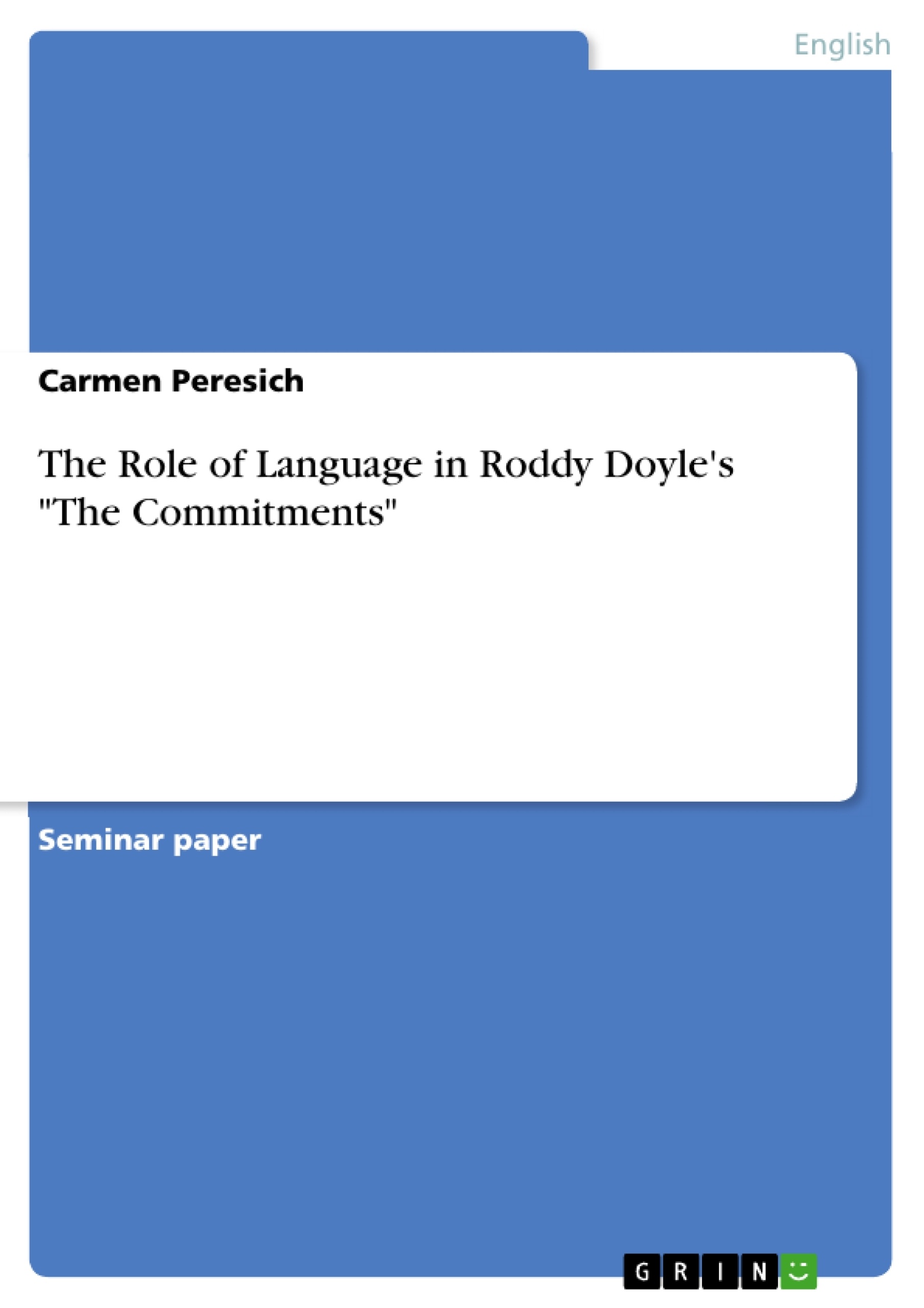The aim of this paper is to have a closer look at language in Roddy Doyle’s "The Commitments" in order to describe the strategies the author uses in terms of language to offer the readership a possibility to identify with the characters easily as well as to make the language appear authentic.
These strategies affect almost all areas of language. Since dialogue is the driving force in "The Commitments", what in itself plays an important role, the language used in the novel is strongly oriented towards oral speech.
Therefore, Doyle chooses to use vernacular rather than Standard English. Thus, in particular spelling and vocabulary tremendously differ from what readers normally expect to find in a novel. Moreover, the language used allows the reader to draw inferences about the characters.
In the following I will discuss these characteristics by reference to selected examples and reason why and how they contribute to create authenticity and facilitate reader identification.
Inhaltsverzeichnis (Table of Contents)
- Introduction
- Dialogue as the driving force
- Strategies
- Use of vernacular instead of standard speech
- Spelling
- Vocabulary
- Implications of the language used by the characters
- Summary
Zielsetzung und Themenschwerpunkte (Objectives and Key Themes)
This paper examines the role of language in Roddy Doyle's The Commitments, focusing on how the author uses language to create a sense of authenticity and facilitate reader identification with the working-class characters. The paper analyzes the author's strategies in terms of language, particularly the use of vernacular instead of standard speech, and its impact on the overall narrative.
- The importance of dialogue in shaping the narrative of The Commitments
- The use of vernacular language as a tool for creating authenticity and facilitating reader identification
- The author's strategies in terms of spelling and vocabulary to portray the characters' spoken language
- The impact of the language used by the characters on the reader's perception of the story and its themes
- The role of language in drawing a detailed picture of the working-class characters in Dublin.
Zusammenfassung der Kapitel (Chapter Summaries)
The introduction provides background information on Roddy Doyle and his novel The Commitments, highlighting the novel's focus on the lives of working-class individuals in 1980s Dublin. The second chapter delves into the significance of dialogue in Doyle's writing, particularly in The Commitments, where it serves as the primary driving force of the narrative. The absence of a conventional narrator and the use of dialogue-driven storytelling create a sense of immediacy and allow the reader to experience the story as if they were part of the characters' conversations.
The third chapter examines specific linguistic strategies employed by Doyle, including his deliberate use of vernacular instead of standard English. The chapter explores how this choice contributes to the authenticity of the characters' voices and creates a more intimate and relatable reading experience for the reader.
Schlüsselwörter (Keywords)
The main keywords and focus topics of the text include: Roddy Doyle, The Commitments, working-class Dublin, vernacular language, dialogue, authenticity, reader identification, narrative voice, social commentary, and Irish literature.
Frequently Asked Questions
What is the central theme of the analysis of Roddy Doyle's "The Commitments"?
The analysis focuses on the role of language, specifically how Roddy Doyle uses vernacular and dialogue to create authenticity and help readers identify with the working-class characters of Dublin.
Why is dialogue considered the "driving force" in this novel?
"The Commitments" relies heavily on dialogue rather than a conventional narrator. This technique creates a sense of immediacy, making the reader feel like an observer of the characters' actual conversations.
How does Doyle's use of vernacular differ from Standard English?
Doyle deliberately uses non-standard spelling and vocabulary to mirror the oral speech of working-class Dubliners. This departs from traditional literary expectations to achieve a more realistic portrayal.
What are the linguistic strategies used by the author?
Key strategies include the use of local slang, phonetic spelling to capture accents, and a focus on the rhythm of oral speech, all aimed at enhancing the novel's authenticity.
How does the language influence reader identification?
By using the characters' natural language, Doyle removes the distance between the reader and the story, allowing for a deeper emotional connection and a better understanding of the characters' social backgrounds.
- Citar trabajo
- Bakk. MA Carmen Peresich (Autor), 2014, The Role of Language in Roddy Doyle's "The Commitments", Múnich, GRIN Verlag, https://www.grin.com/document/289241



